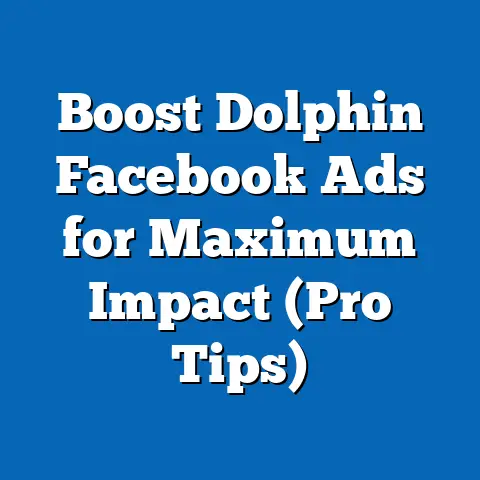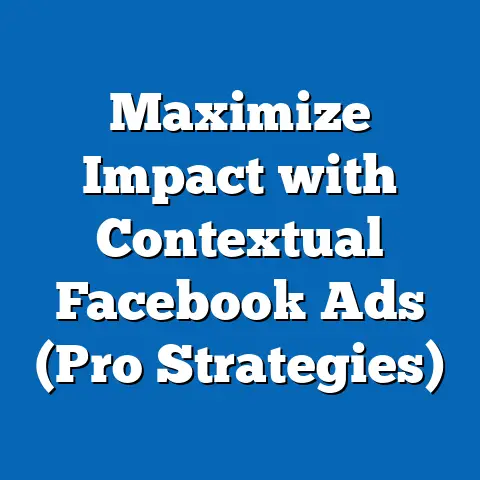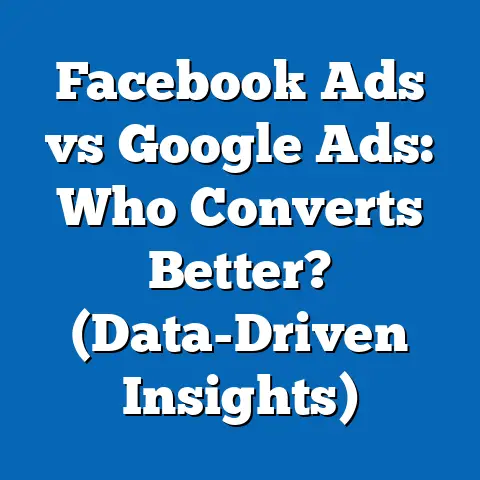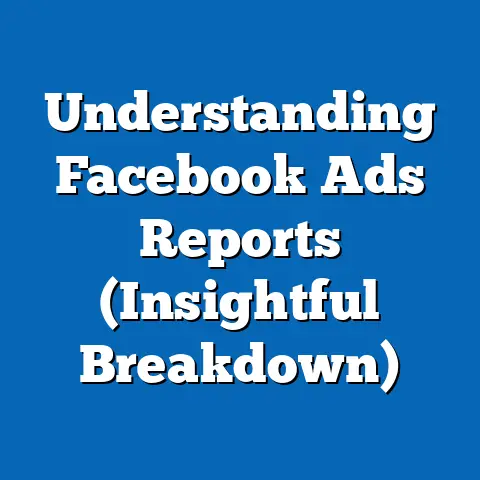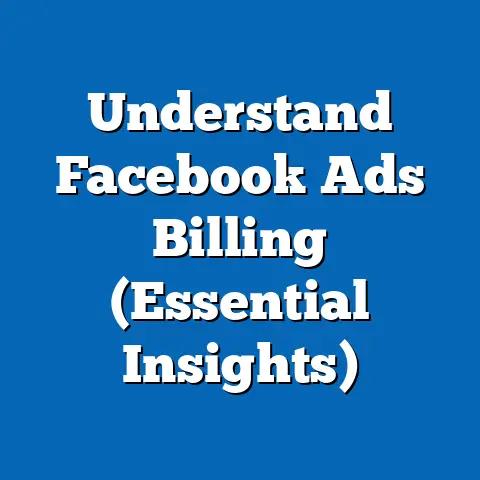Mastering Lead Management on Facebook (Proven Strategies)
In today’s hyper-connected digital landscape, businesses face an unprecedented challenge: how to effectively capture, nurture, and convert leads in an environment where attention spans are fleeting and competition is fierce. Facebook, with over 2.9 billion monthly active users as of 2023 (Statista, 2023), stands as a colossus in the realm of social media marketing, offering unparalleled opportunities for lead generation. Yet, the sheer volume of users, coupled with evolving algorithms and privacy regulations, makes mastering lead management on this platform a complex endeavor.
The stakes are high. Effective lead management on Facebook can drive significant revenue growth, build brand loyalty, and create lasting customer relationships. However, missteps—such as poorly targeted ads, inefficient follow-up processes, or failure to adapt to platform changes—can result in wasted budgets and missed opportunities.
Defining Lead Management on Facebook: Core Characteristics
Lead management on Facebook refers to the systematic process of identifying, capturing, nurturing, and converting potential customers (leads) through the platform’s advertising and engagement tools. At its core, it involves creating targeted campaigns, leveraging user data for personalization, and optimizing follow-up processes to move prospects through the sales funnel. Key characteristics of effective lead management on this platform include precision targeting, real-time analytics, and seamless integration with customer relationship management (CRM) systems.
Precision targeting is made possible through Facebook’s robust advertising platform, which allows businesses to segment audiences based on demographics, interests, behaviors, and even life events. Real-time analytics, provided through tools like Facebook Ads Manager, enable marketers to track campaign performance and adjust strategies on the fly. Integration with CRM systems ensures that leads are not lost in the shuffle, allowing for automated follow-ups and personalized communication.
Unlike traditional lead generation methods—such as cold calling or direct mail—Facebook lead management thrives on immediacy and interactivity. Users expect quick responses, engaging content, and offers tailored to their needs. Failure to meet these expectations can result in disengagement, highlighting the need for agility and responsiveness in strategy design.
Historical Context: The Evolution of Lead Generation and Social Media Marketing
To understand the current state of lead management on Facebook, it is essential to trace the evolution of both lead generation practices and social media marketing. In the pre-digital era, lead generation relied heavily on in-person networking, print advertising, and telemarketing. These methods were often costly, time-intensive, and difficult to measure in terms of return on investment (ROI).
The advent of the internet in the late 1990s and early 2000s marked a turning point. Email marketing and search engine optimization (SEO) emerged as powerful tools for capturing leads online. However, it was the rise of social media platforms in the mid-2000s that revolutionized the landscape. MySpace, one of the earliest social networks, introduced the concept of connecting with audiences on a personal level, though its commercial potential remained limited.
Facebook, launched in 2004, quickly surpassed its predecessors by offering a platform for both personal interaction and business engagement. By 2007, the introduction of Facebook Pages allowed businesses to establish an online presence, while the launch of Facebook Ads in 2008 provided a mechanism for targeted advertising. Over the next decade, features like Lead Ads (introduced in 2015) and advanced audience targeting transformed the platform into a lead generation powerhouse.
Significant historical events have also shaped the trajectory of lead management on Facebook. The 2018 Cambridge Analytica scandal, which exposed misuse of user data, led to heightened scrutiny of privacy practices and stricter regulations, such as the General Data Protection Regulation (GDPR) in Europe. These developments forced businesses to rethink their data collection strategies, emphasizing transparency and consent in lead management.
Economically, the Great Recession of 2008-2009 pushed many businesses to seek cost-effective marketing solutions, accelerating the adoption of social media advertising. Culturally, the shift toward mobile-first internet usage—catalyzed by the proliferation of smartphones—made platforms like Facebook indispensable for reaching on-the-go consumers. Understanding this historical context underscores the dynamic nature of lead management and the need for continuous adaptation.
Societal Implications: The Broader Impact of Digital Lead Management
The rise of lead management on Facebook has far-reaching societal implications, influencing consumer behavior, privacy norms, and economic structures. At the individual level, targeted advertising has reshaped how people interact with brands. Consumers are now accustomed to personalized experiences, expecting ads and offers that align with their interests and needs.
However, this personalization comes at a cost. The reliance on user data for lead generation has sparked debates about privacy and data security. High-profile data breaches and scandals have eroded trust in social media platforms, prompting calls for greater regulation. For instance, a 2022 Pew Research Center survey found that 64% of Americans are concerned about how companies use their personal information (Pew Research Center, 2022).
Economically, Facebook lead management has democratized marketing by enabling small businesses and entrepreneurs to compete with larger corporations. Tools like Lead Ads and budget-friendly ad campaigns allow startups to reach niche audiences without the need for massive marketing budgets. This shift has contributed to the growth of the gig economy and e-commerce, as individuals and small teams leverage the platform to build customer bases.
Culturally, the emphasis on digital engagement has altered communication norms. Businesses must now prioritize authenticity and transparency to build trust with audiences wary of overt sales tactics. Moreover, the global reach of Facebook has facilitated cross-cultural marketing, though it also presents challenges in navigating cultural sensitivities and local regulations.
These societal shifts highlight the dual nature of lead management on Facebook: while it offers immense opportunities for connection and growth, it also raises ethical questions about data use, consumer manipulation, and digital equity. Addressing these concerns is crucial for sustainable and responsible marketing practices.
Proven Strategies for Mastering Lead Management on Facebook
To navigate the complexities of lead management on Facebook, businesses must adopt proven strategies that balance innovation with ethical considerations. Below, we outline key approaches, supported by data and expert insights, to optimize lead generation and conversion on the platform.
1. Leveraging Precision Targeting for Audience Segmentation
Facebook’s advertising platform offers unparalleled targeting capabilities, allowing businesses to reach specific demographics, interests, and behaviors. For instance, a fitness brand can target users aged 18-35 who have expressed interest in gym memberships or workout apps. According to a 2021 study by Hootsuite, ads with precise targeting achieve up to 30% higher conversion rates compared to broadly targeted campaigns (Hootsuite, 2021).
To maximize effectiveness, businesses should use tools like Custom Audiences to retarget website visitors or existing customers. Lookalike Audiences can also help identify new prospects who share characteristics with high-value leads. However, it’s critical to avoid over-segmentation, which can limit reach and increase ad costs.
2. Utilizing Lead Ads for Seamless Capture
Facebook Lead Ads simplify the process of capturing user information by allowing prospects to submit their details directly within the platform, without navigating to an external landing page. This reduces friction and increases completion rates. A 2020 report by WordStream found that Lead Ads generate up to 4x more leads per dollar spent compared to traditional ad formats (WordStream, 2020).
To optimize Lead Ads, businesses should keep forms concise, requesting only essential information (e.g., name and email). Offering incentives, such as discounts or free resources, can further boost submissions. Additionally, integrating Lead Ads with a CRM system ensures immediate follow-up, preventing leads from going cold.
3. Crafting Compelling and Authentic Content
Content is the cornerstone of engagement on Facebook. Unlike traditional advertising, which often prioritizes direct sales pitches, successful lead management on Facebook relies on storytelling and value-driven content. Videos, carousels, and interactive posts tend to perform better than static images, with a 2022 Sprout Social report noting that video content drives 66% more engagement on the platform (Sprout Social, 2022).
Authenticity is equally important. Consumers are increasingly skeptical of overly polished or sales-heavy content. Sharing customer testimonials, behind-the-scenes glimpses, or educational posts can build trust and foster a sense of community. Businesses should also align content with current trends and cultural moments to remain relevant.
4. Implementing Automated Follow-Up Processes
Timely follow-up is critical in lead management, as delays can result in lost opportunities. Automated tools, such as chatbots and email sequences, can streamline this process. For example, a chatbot can instantly respond to inquiries on a Facebook Page, while CRM integration can trigger personalized emails based on user actions.
Data from HubSpot indicates that leads contacted within the first hour are 7x more likely to convert than those contacted later (HubSpot, 2021). Automation not only ensures speed but also allows for scalability, enabling businesses to manage large volumes of leads without sacrificing personalization.
5. Adapting to Algorithm Changes and Privacy Regulations
Facebook’s algorithm is in constant flux, impacting ad reach and visibility. For instance, updates prioritizing meaningful interactions over passive content consumption have reduced organic reach for businesses. Staying informed about these changes and adjusting strategies—such as focusing on engagement-driven content—is essential.
Privacy regulations, such as GDPR and Apple’s App Tracking Transparency (ATT) framework, have also reshaped lead management. Businesses must prioritize transparency, clearly communicating how data is collected and used. Offering opt-in mechanisms and focusing on first-party data (e.g., email subscriptions) can mitigate the impact of restricted tracking.
6. Measuring and Optimizing Performance
Continuous measurement is a hallmark of successful lead management. Facebook’s Ads Manager provides detailed metrics on impressions, click-through rates (CTR), cost per lead (CPL), and conversion rates. Regularly analyzing these metrics allows businesses to identify underperforming campaigns and allocate budgets effectively.
A/B testing is another valuable tool, enabling marketers to compare different ad creatives, copy, and targeting options. According to a 2023 study by MarketingSherpa, companies that consistently test their campaigns achieve up to 37% higher ROI (MarketingSherpa, 2023). Optimization should be an ongoing process, driven by data rather than assumptions.
Technological, Economic, and Cultural Factors Shaping Lead Management
The effectiveness of lead management on Facebook is influenced by a range of external factors, each presenting both opportunities and challenges. Technologically, advancements in artificial intelligence (AI) and machine learning have enhanced targeting precision and predictive analytics. Tools like Facebook’s Automated Ads leverage AI to optimize campaigns in real time, reducing manual effort.
Economically, the cost of advertising on Facebook varies widely based on industry, audience, and competition. While the platform remains relatively affordable compared to traditional media, rising ad costs—driven by increased demand—require businesses to focus on efficiency. Small businesses, in particular, must balance budget constraints with the need for impactful campaigns.
Culturally, generational differences play a significant role in shaping user behavior on Facebook. While younger generations (e.g., Gen Z) may prioritize platforms like Instagram or TikTok, older demographics (e.g., Baby Boomers) remain active on Facebook, making it a key channel for industries like healthcare or real estate. Understanding these nuances is critical for tailoring content and messaging.
Moreover, cultural attitudes toward privacy and data sharing vary across regions. In Europe, where GDPR compliance is mandatory, users are more likely to scrutinize data collection practices. In contrast, markets with less stringent regulations may offer greater flexibility but still require ethical considerations to maintain trust.
Nuances and Diversity in Lead Management Approaches
Lead management on Facebook is not a one-size-fits-all endeavor. Businesses must account for diversity in audience preferences, industry dynamics, and geographic contexts. For instance, a B2B company targeting corporate decision-makers may prioritize LinkedIn-style content on Facebook, such as whitepapers or webinars, while a B2C retailer might focus on visually driven campaigns.
Geographic differences also matter. In emerging markets, where mobile internet usage dominates, optimizing for mobile-first experiences is essential. Language, cultural references, and payment preferences must also be localized to resonate with specific audiences.
Additionally, not all leads are created equal. Some may require extensive nurturing through educational content, while others are ready to convert immediately. Segmenting leads based on their stage in the buyer’s journey ensures that resources are allocated effectively, avoiding the pitfall of treating all prospects identically.
Implications for Businesses, Society, and the Digital Ecosystem
The strategies and trends discussed above have profound implications across multiple domains. For businesses, mastering lead management on Facebook can drive competitive advantage, enabling faster growth and stronger customer relationships. However, it also demands ongoing investment in skills, tools, and adaptability to keep pace with platform changes.
Societally, the reliance on digital lead generation raises questions about equity and access. While Facebook offers opportunities for small businesses, larger corporations with bigger budgets often dominate ad auctions, potentially widening the gap between established players and newcomers. Additionally, the digital divide—where certain demographics lack access to reliable internet—limits the reach of such strategies in underserved regions.
In the workplace, the shift toward digital marketing has created demand for new skill sets, such as data analysis, content creation, and social media management. Companies must invest in training to build these capabilities, while employees face pressure to stay updated on evolving tools and trends.
Culturally, the normalization of targeted advertising shapes perceptions of privacy and personal agency. As consumers become more aware of data usage, businesses must prioritize ethical practices to avoid backlash. Transparency, consent, and value exchange (e.g., offering meaningful content in return for data) are becoming non-negotiable components of lead management.
Forward-Looking Insights: The Future of Lead Management on Facebook
Looking ahead, the landscape of lead management on Facebook is poised for further transformation, driven by technological innovation and societal shifts. The integration of augmented reality (AR) and virtual reality (VR) into advertising—through initiatives like Meta’s metaverse—could redefine how businesses engage with leads, offering immersive experiences that go beyond traditional ads.
Privacy regulations will continue to evolve, likely becoming more stringent. Apple’s ATT framework and Google’s planned phase-out of third-party cookies signal a broader move toward user-controlled data environments. Businesses will need to pivot toward first-party data strategies, such as building email lists or leveraging on-platform engagement, to sustain lead generation efforts.
Generational shifts will also influence strategies. As Gen Z and younger cohorts become a larger share of the consumer base, businesses must adapt to their preference for authenticity, social impact, and short-form content. Meanwhile, retaining engagement with older demographics on Facebook will remain crucial for certain industries.
Uncertainty remains a constant in this space. Algorithm updates, geopolitical events, and economic fluctuations can disrupt even the most well-planned strategies. Flexibility and a commitment to continuous learning will be key to navigating these unknowns.
Conclusion: Building Sustainable Success in Lead Management
Mastering lead management on Facebook is both an art and a science, requiring a blend of creativity, data-driven decision-making, and ethical responsibility. By leveraging precision targeting, optimizing Lead Ads, crafting authentic content, and staying adaptable, businesses can unlock the platform’s full potential for lead generation and conversion. However, success also hinges on understanding the broader context—historical, societal, and cultural—that shapes user behavior and platform dynamics.
As we move into an increasingly complex digital future, the ability to balance innovation with accountability will define the leaders in this space. While challenges abound, so do opportunities for those willing to invest in mastering the nuances of lead management on Facebook. By doing so, businesses not only drive growth but also contribute to a more transparent and equitable digital ecosystem.

